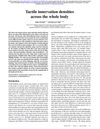 2 citations,
August 2023 in “Development”
2 citations,
August 2023 in “Development” Hair follicles in the back of the rosette fancy mouse have reversed orientations due to a gene mutation.
 December 2023 in “Journal of molecular structure”
December 2023 in “Journal of molecular structure” Hair treatments and dehydration affect hair's lipid and protein behavior, influencing its flexibility and appearance.
1 citations,
December 2023 in “Biomolecules” Regulating cell death in hair follicles can help prevent hair loss and promote hair growth.
2 citations,
July 2023 in “Cosmetics” Surfactants in shampoos and conditioners remove some but not all lipids from hair, and more research is needed to understand their full impact.
 1 citations,
October 2022 in “Annals of Translational Medicine”
1 citations,
October 2022 in “Annals of Translational Medicine” Cucurbitacin helps mice grow hair by blocking a protein that stops hair growth.
 January 2024 in “Jurnal Ilmiah Ibnu Sina (JIIS) Ilmu Farmasi dan Kesehatan”
January 2024 in “Jurnal Ilmiah Ibnu Sina (JIIS) Ilmu Farmasi dan Kesehatan” The F2 hair tonic with shallot extract is effective and stable for hair growth.
4 citations,
August 2023 in “Biomedicine & Pharmacotherapy” Ivacaftor can protect against noise-induced hearing loss by reducing oxidative stress.
 17 citations,
December 2004 in “The Journal of Men's Health & Gender”
17 citations,
December 2004 in “The Journal of Men's Health & Gender” Male pattern baldness involves hormone-related hair thinning, shorter hair, and inflammation.
12 citations,
April 2015 in “BMC research notes” Root hairs in cereal crops can grow beyond the usual zone, and using Turface® clay helps study this.
30 citations,
January 2009 in “The scientific world journal/TheScientificWorldjournal” Hair is hard to dissolve because of its complex proteins, but certain solvents that break specific bonds and hydrate can do it.
 5 citations,
February 2008 in “Experimental Dermatology”
5 citations,
February 2008 in “Experimental Dermatology” Cyclosporin A promotes hair growth in mice and increases a protein linked to hair growth, but it may not work the same way in humans.
 15 citations,
January 2015 in “Skin Pharmacology and Physiology”
15 citations,
January 2015 in “Skin Pharmacology and Physiology” Parathyroid hormones are important for hair growth, but their use in treating hair loss from chemotherapy is still uncertain.
 14 citations,
March 1995 in “Journal of cell science”
14 citations,
March 1995 in “Journal of cell science” SV40 T antigen in hair follicles causes abnormal hair and health issues in mice.
January 2019 in “Deleted Journal” Biofield Energy Healing may promote hair growth and treat skin disorders by enhancing hair follicle development.
 April 2024 in “Jurnal Agroindustri Halal/Jurnal agroindustri halal”
April 2024 in “Jurnal Agroindustri Halal/Jurnal agroindustri halal” The hair tonic with the highest seaweed extract content showed the best hair growth results.
 June 2021 in “Journal of Emerging Technologies and Innovative Research”
June 2021 in “Journal of Emerging Technologies and Innovative Research” Rice water and hibiscus can help improve hair health and growth.
19 citations,
February 2016 in “Journal of Biological Chemistry” KCNQ potassium channels help control the sensitivity of touch receptors in the skin.
 12 citations,
February 2022 in “Acta Biomaterialia”
12 citations,
February 2022 in “Acta Biomaterialia” Minoxidil-loaded hyaluronic acid microneedles can effectively increase hair growth and could be a promising treatment for hair loss.
 2 citations,
January 2008 in “Elsevier eBooks”
2 citations,
January 2008 in “Elsevier eBooks” Humans have limited regenerative abilities, but new evidence shows the adult brain and heart can regenerate, and future treatments may improve this by mimicking stem cell environments.
 February 2024 in “Tissue & Cell”
February 2024 in “Tissue & Cell” New tissue engineering strategies show promise for regenerating human hair follicles, which could improve hair loss treatments.
 23 citations,
November 2015 in “Phytotherapy Research”
23 citations,
November 2015 in “Phytotherapy Research” Certain herbal compounds, especially from bitter melon, can inhibit cancer growth and promote hair growth by blocking PAK1.
 13 citations,
January 2017 in “Molecules”
13 citations,
January 2017 in “Molecules” Compounds from Alpinia zerumbet may help with hair regrowth and cancer treatment by targeting PAK1.
 January 2024 in “Journal of Cosmetics, Dermatological Sciences and Applications”
January 2024 in “Journal of Cosmetics, Dermatological Sciences and Applications” Injecting a peptide-hyaluronic acid mix improved hair growth in men with hair loss and was safe.
May 2020 in “International journal of molecular biology” Mutations in the AR gene cause hair thinning and loss.
 35 citations,
March 2005 in “Journal of Investigative Dermatology”
35 citations,
March 2005 in “Journal of Investigative Dermatology” Potassium channel openers like minoxidil help hair grow by acting on hair follicles.
March 2022 in “International Journal of Trichology” Smoking may worsen hair loss, but more research is needed.
 44 citations,
February 2012 in “The journal of neuroscience/The Journal of neuroscience”
44 citations,
February 2012 in “The journal of neuroscience/The Journal of neuroscience” Mutations in the PTPRQ gene cause significant balance issues in mice due to hair bundle defects in the inner ear.
 57 citations,
July 2005 in “Genetics”
57 citations,
July 2005 in “Genetics” Key genes are crucial for Drosophila wing development and could be insecticide targets.
 4 citations,
February 2022 in “International Journal of Molecular Sciences”
4 citations,
February 2022 in “International Journal of Molecular Sciences” Myotonic Dystrophy may age cells faster, and drugs that target aging could be potential treatments.
 4 citations,
April 2020 in “bioRxiv (Cold Spring Harbor Laboratory)”
4 citations,
April 2020 in “bioRxiv (Cold Spring Harbor Laboratory)” The skin has about 230,000 touch-sensitive nerve fibers, with high concentrations in the hands and face.





















